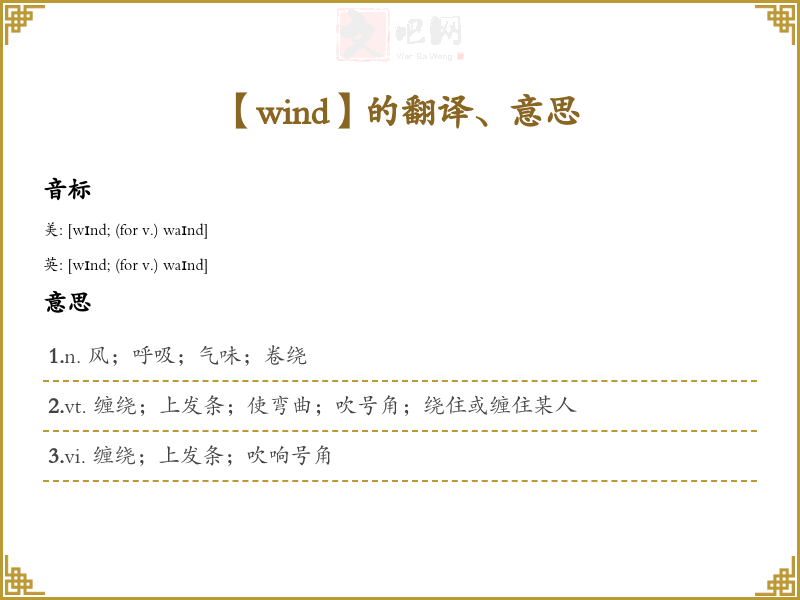【wind】的翻译、意思
时间: 2025-04-26 13:37:51
【wind】怎么读
美:[wɪnd; (for v.) waɪnd]
英:[wɪnd; (for v.) waɪnd]
【wind】是什么意思、字义解释
1. n. 风;呼吸;气味;卷绕
2. vt. 缠绕;上发条;使弯曲;吹号角;绕住或缠住某人
3. vi. 缠绕;上发条;吹响号角
4. n. (Wind)人名;(英、德、瑞典)温德
【wind】的详细解释
英文单词学*与分析:[wind]
1. 基本定义:
- 字面意思:Wind 指的是空气的流动,通常是指大气中的气流。清晰的定义为:一种自然现象,指气体在大气中的**,通常由温差和气压差异造成。
- 词性:名词(noun)和动词(verb)。
2. 词源与起源:
- 词源分析:Wind 来源于古英语“wind”,其根源可追溯到原始日耳曼语“windaz”,意指“空气的流动”。该词没有前缀和后缀,直接表述气流的概念。
- 历史背景:该词的首次使用可以追溯到公元前5世纪的日耳曼部落,可能出现在古老的文学作品中,例如《贝奥武夫》(Beowulf)中提到自然现象时使用了类似的词汇。
- 课本:在**的英语教材中,通常在小学四年级到中学阶段出现,例如《新概念英语》。在牛津及美国的教材中,这个词一般在初学者的教材中出现,通常在四年级到六年级的阅读理解部分。
3. 使用场景:
- 正式与非正式语境:
- 正式:在气象学、环境科学和文学作品中,如“the wind is a significant factor in climate change(风是气候变化的重要因素)”。
- 非正式:在日常交流中,如“It's a bit windy today(今天有点风)”。
- 特殊场合:在法律文件中,可能用于描述与天气相关的条款,如“force majeure due to extreme wind conditions(由于极端风况导致的不可抗力)”。在科学领域,常用于描述风速和风向的测量。
4. 示例句子:
-
The wind is howling outside.
风在外面呼啸着。
(出处:日常交流) -
We need to consider the wind when planning the outdoor event.
我们在策划户外活动时需要考虑风的因素。
(出处:商务对话) -
The wind carried the scent of flowers into the room.
风把花香带进了房间。
(出处:文学作品) -
A strong wind can cause damage to buildings.
强风可能会对建筑物造成损害。
(出处:气象学) -
She felt the wind in her hair as she rode the bike.
她骑着自行车时感受到了风在她的头发中吹拂。
(出处:日常交流)
*. The wind turbine generates electricity from wind energy.
风力涡轮机利用风能发电。
(出处:科学文献)
-
In the autumn, the wind often brings cooler temperatures.
在秋天,风常常带来更凉爽的气温。
(出处:气象学) -
The sailors adjusted their sails according to the wind.
水手们根据风的方向调整帆。
(出处:航海文献) -
The wind whispered through the trees.
风在树间轻声低语。
(出处:文学作品) -
A gentle wind rustled the leaves.
微风轻轻摇动树叶。
(出处:自然描写)
5. 同义词与反义词:
-
同义词:
- Breeze:指轻风,通常用于描述温和的气流。
- Gust:指阵风,强调短暂且突发的强风。
- Draft:通常指房间内的空气流动,强调局部的风。
-
反义词:
- Calm:指没有风的状态,强调静止和安静。
- Stillness:指完全没有**的状态,通常形容空气的静止。
. 学方法:
- 音标记忆法:/wɪnd/,可以通过发音练*帮助记忆。
- 词根记忆法:理解“wind”作为自然现象的根源,帮助联想与自然相关的词汇,如“windy”(多风的)。
- 谐音联想记忆:可以联想“wind”与“蜿蜒(wān yán)”的声音,记住它们都与空气流动相关。
7. 关联词汇:
- Wind speed:风速
- Wind direction:风向
- Wind turbine:风力涡轮机
- Wind chill:风寒效应
- Windstorm:强风暴
通过对“wind”的全面分析与学*,可以更好地理解和应用这个词汇。
【wind】例句
1、[N-VAR] A wind is a current of air that is moving across the earth's surface. 风
-
例:There was a strong wind blowing.正刮着一阵大风。
2、[N-COUNT] Journalists often refer to a trend or factor that influences events as a wind of a particular kind. (影响事态发展的) 趋势; 因素
-
例:The winds of change are blowing across the country.转变之风正吹遍全国。
3、[V-T] If you are winded by something such as a blow, the air is suddenly knocked out of your lungs so that you have difficulty breathing for a short time. 呼吸困难
-
例:He was winded and shaken.他呼吸困难,身体发抖。
4、[PHRASE] If someone breaks wind, they release gas from their intestines through their anus. 放屁
-
例:If I break wind at dinner, should I say "Pardon," or pretend nothing has happened?如果我在用餐的时候放屁,我是应该说“对不起”,还是假装什么事情都没发生?
5、[[非正式]] If you get wind of something, you hear about it, especially when someone else did not want you to know about it. 听到…的消息 (尤指在别人不想让知道的情况下)
-
例:I don't want the public, and especially not the press, to get wind of it at this stage.我不想让公众,尤其是新闻界,在这个阶段听到什么消息。
6、[V-T/V-I] If a road, river, or line of people winds in a particular direction, it goes in that direction with a lot of bends or twists in it. (路、河流或一行人) 蜿蜒而行
-
例:Quiet mountain roads wind through groves of bamboo and cedar.幽静的山路蜿蜒穿过竹林和雪松林。
-
例:...a narrow winding road.…一条狭窄蜿蜒的道路。
-
例:We wound our way southeast.我们向东南方向蜿蜒前行。
7、[V-T] When you wind something flexible around something else, you wrap it around it several times. 缠绕
-
例:The horse jumped forward and around her, winding the rope around her waist.那匹马向前一跳,然后围着她把绳子缠在她的腰际。
8、[V-T] When you wind a mechanical device, for example, a watch or a clock, you turn a knob, key, or handle on it several times in order to make it operate. 给 (钟表等) 上发条
-
例:I still hadn't wound my watch so I didn't know the time.我还没给手表上发条,所以我不知道时间。
9、[PHRASAL VERB] Wind up means the same as wind. 给 (钟表等) 上发条
-
例:I wound up the watch and listened to it tick.我给手表上好发条,听着它滴答作响。
10、[V-T] To wind a tape or film back or forward means to make it move toward its starting or ending position. 倒/快进 (磁带或胶卷)
-
例:The camcorder winds the tape back or forward at high speed.便携式摄像机可以高速度倒带或快进。
11、[N] a single turn, bend, etc 拐弯
-
例:a wind in the river
